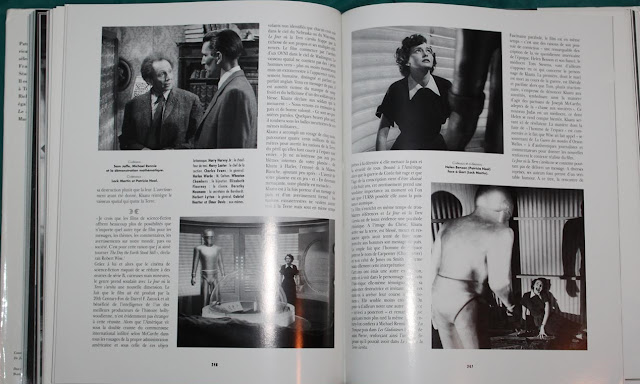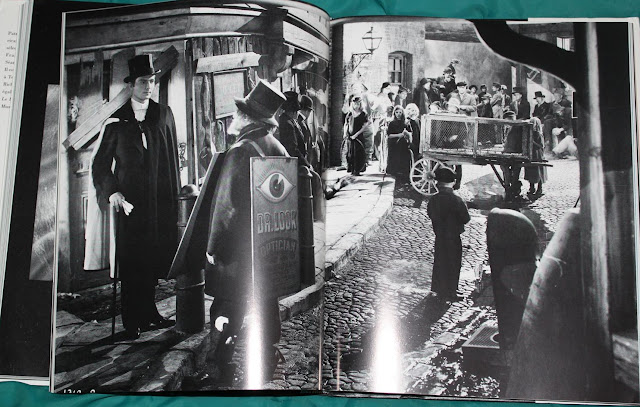Archive for January 2012
Bob Clampbett’s John Carter of Mars Cartoon
A lot of people are just discovering that animation great Bob Clampbett worked on an aborted John Carter of Mars project way back in 1935, thanks to the Youtube test footage for the cartoon, which originally appeared on the 2000 Beany & Cecil DVD (which, by the way, happens to be one of the all time great DVD’s).
However, many of us learned about this project way back in 1976, courtesy of Jim Steranko’s Mediascene. Issue #21 of the mag was a “special animation issue” which included articles on Chuck Jones, Winsor McCay, Max Flieischer, and other titans of Hollywood cartoons. But the real eye opener for most of us was a giant two page article by Carl Macek which fueled our imaginations with one of the great “what ifs” of animation and film history. As a pull out quote in the article put it: “Had the John Carter series been filmed, the entire focus of animation might have been altered significantly.” It made us realize that just because someone has a great idea, it does not mean that Hollywood will help it become a reality. The story of John Carter made us wonder what other great films remained just dreams in the Hollywood Dream Factory.
Here’s the article. Feel free to click on the images to make them legible.
And here’s the test footage, which, as I already said, originally appeared on the great Beany & Cecil DVD.
Workers Leaving the Factory: Burton’s Charlie and the Chocolate Factory
Near the beginning of the 2005, Tim Burton directed film, Charlie and the Chocolate Factory, Willie Wonka fires all of his workers. One might expect the film’s resolution to include at least a token gesture towards a return to the level of employment of the locals that existed at the film’s start. But if you did expect this, you would be disappointed, for even though Charlie ends up winning the factory, even though his grandfather was one of the fired workers, in the end no one suggests that the workers should or will get their jobs back. In fact, the issue is completely forgotten by the film, as if it were never an issue to begin with. If it were raised, the big question would be: what happens to the Oompah Loompahs, the scabs Wonka hires to replace the fired workers, bringing them in from a mysterious country that apparently only he knows about? (They don’t work for peanuts; they work for cocoa beans!) The film gives every indication that the Oompah Loompahs will continue to work in the factory. They appear to be happy. They sing, they dance, obeying Wonka’s every command. Happy workers, are, after all, irreplaceable.
Is the disappearance of this issue an indicator of something larger than the film? Perhaps a sign of how the filmmakers regard laborers? Or does it reflect the concerns of our society itself?
Charlie wins the factory despite not knowing that he’s in a contest and the factory is the prize. The kids that lose are all portrayed as worthy losers. Why are they unworthy? Because they disobey Wonka. It’s that simple. unlike the singing and dancing Oompah Loompahs, the kids will not make good workers because they don’t take orders very well. They act according to their own desires which make them seem like sinners worthy of punishments that would not be out of place in Dante’s Inferno. Happy workers they will not grow up to be. Charlie, however, does not disobey Wonka. Proving he has what it takes to be a happy worker, Charlie wins the contest, but becomes, somewhat paradoxically, much more than just another happy worker. He becomes the factory’s owner.
The ultimate lesson of the film? Suck it up to your boss and you will get far. Very far, indeed! On the other hand, if you don’t follow orders, if you upset the boss in some way, expect to be replaced by an Oompah Loompah. Not exactly the lesson you would expect from a Tim Burton film, is it? (Perhaps not. I’ve already written how another one of his films, The Nightmare Before Christmas, which ends up sending a surprisingly conservative message. But perhaps it’s just the Hollywood tendency to make conservative films, which I’ve written about here.)
Patrick Brion’s Le Cinéma Fantastique
LE CINÉMA FANTASTIQUE by Patrick Brion, Martinière (Editions de La), 1996. Condition: Good.
The subtitle translates as “the great American classics from The Lost World to 2001: A Space Odyssey.” This is a French book, but with lots of very nice, large images, some examples of which are below. It covers the classics of Hollywood cinema from the genre the French call the fantastique, which includes horror and science fiction. Currently, the cheapest price you will find on the net is US$134, as offered by a dealer in Germany.
UPDATE: Sold.
 |
| LE CINÉMA FANTASTIQUE by Patrick Brion, front cover |
 |
| LE CINÉMA FANTASTIQUE by Patrick Brion, back cover |
 |
| LE CINÉMA FANTASTIQUE by Patrick Brion, from entry on The Day the Earth Stood Still |
 |
| LE CINÉMA FANTASTIQUE by Patrick Brion, from entry on The Portrait of Dorian Gray |
 |
| LE CINÉMA FANTASTIQUE by Patrick Brion, from entry on Dr. Jeckyl and Mr. Hyde |
This book is not in mint condition. During shipment from the original seller, the book was slightly damaged around the corners and the binding is slightly cracked at one point as seen in these pictures:
 |
| LE CINÉMA FANTASTIQUE by Patrick Brion, cover damage |
 |
| LE CINÉMA FANTASTIQUE by Patrick Brion, cover damage |
 |
| LE CINÉMA FANTASTIQUE by Patrick Brion, binding slightly cracked on this page |
Animated Films: “Kick Me” by Robert Swarthe
“Kick Me,” by Robert Swarthe, is an animated film made by drawing directly on celluloid. Most such films, as exemplified by Norman McLaren, are usually mostly abstract works, but this is a comedy with a central character.
“Kick Me” was apparently Swarthe’s only animated film or personal work, after which he has credits on a few Hollywood type films including Close Encounters of the Third Kind. However, his IMDB credits end in 1983, with Coppola’s The Outsiders, although he makes an appearance in a 2001 released doc on the making of Close Encounters. What happened to him?
Binary Concepts: Gemeinschaft vs. Gesellschaft
Two of my favorite concepts are the binary pair of Gemeinschaft and Gesellschaft. First introduced in print in 1887 by the German sociologist Ferdinand Tönnies, Gemeinschaft, in short, means community, a place where everybody knows your name. Gesellschaft, on the other hand, is a society where greed is good, and nobody sticks their necks out for anyone but themselves. It’s the difference between Bedford Falls and Pottersville.
Where do you live: Bedford Falls or Pottersville?
ADDITIONAL THOUGHTS
1. Film noir is often about a character who is stuck in a Gesellschaft world, but trying to get to a Gemeinschaft world. Think The Asphalt Jungle, The Killing, Johnny O’Clock.
2. The Wizard of Oz: the world over the rainbow, Oz = Gemeinschaft; Kansas, at the beginning of the film = Gesellschaft.
3. Brigaddoon = Gemeinschaft ; the New York City of that film = Gesellschaft.
Is Copyright Democratic?
It’s unlikely that if everyone in the world were to suddenly wake up to find themselves in a world where their opinion mattered, one of their opinions would favor copyright law. Why? Because copyright is not democratic. The first copyrights originated from Kings and Queens, and have continued to be used by elites to maintain their power ever since.
Here’s how it works:
1. Copyrights create artificial monopolies.
2. The monopolies use their power to create artificial scarcities.
3. Scarcity leads to prices that are higher than they would otherwise be.
4. Higher prices restrict access.
5. Access is restricted to those who can afford access, which leaves most people on Planet Earth out in the cold.
6. Given such a situation, theft and piracy are inevitable.
7. The best way to combat piracy is to make copyright laws democratic.
8. Good luck with that!
ADDITIONAL THOUGHTS
If you are against piracy from the perspective of so-called creator rights, you should also be for full employment and a living wage as the minimum wage. Wage earners cannot buy the creators’ stuff if they don’t have the money. Of course, if wages increase, prices will increase. So the only way to make a wage increase effective is to put price controls in place. In other words, it’s an economic justice issue which should be looked at from the perspective of what’s best for society as a whole, not just a small group of individuals or corporations.
We need to come up with an unbiased system that works for everyone, not just an elite, and enables everyone access to all information with equal ease, regardless of economic standing.
Animated Shorts: Watch “To Be” Instead of The Prestige
Just watched Christopher Nolan’s overly serious, and a bit tedious, version of Christopher Priest’s novel, The Prestige. My recommendation is that everyone instead watch John Weldon’s National Film Board of Canada animated short, “To Be,” which exploits similar ideas. It’s witty, clever, and provocative; and it didn’t need a multi-million dollar budget and 130 minutes to work its magic.
The Origin of Ren & Stimpy; Or How Do TV Shows Get On TV?
Ever wonder why some TV shows get made while others never see the light of day? The latest issue of Hogan’s Alley (#18), a magazine about comics, cartoons, and the like, includes “An Oral History of Ren & Stimpy” which is especially interesting if read in light of that question. Take, for example, these quotes from Ren & Stimpy executive producer Vanessa Coffey:
My first interaction with [Ren & Stimpy creator John] Kricfalusi was at a hotel in Los Angeles, where I was taking pitches from creators for Nickelodeon. I was an independent producer at the time, consulting for Nickelodeon to help them get into the animation series business with original projects. I clicked with John right away and thought he was very original, to say the least, and I wanted to work with him. I decided that it was worth the risk to set up a meeting for him to meet Nick executives…. Even though it was a very high-level pitch meeting and scared some, John was throwing himself around the room to such an extent that his Certs came flying out of his pocket; it was great!
I wanted to work with him, but was not sure on what because I didn’t love any of his projects–not yet, anyway. After a wild pitch, Nickelodeon execs all agreed that he was a great talent, but [were] not sure what to do together. (my emphasis; Hogan’s Alley #18, p. 45)
So, Vanessa Coffey didn’t like anything that John K. did, but wanted to work with him. She liked him, but not his ideas. In other words, it was all about personality. Is this a new twist on the auteur theory?
My Film School Days with James Gray
What does it take to make it in Hollywood? You might answer right away with “talent.” Yes, but there was an abundance of talent at my film school. Talent was not enough. So what was enough?
I went to USC film school with someone who did make it in Hollywood: James Gray, the guy who directed Little Odessa, etc. Gray has managed to do in Hollywood what most of us wanted to do: write and direct films (with realistic budgets) that he wants to write and direct. How did he do it? What set his films apart from the rest of us? I don’t know that I know the answer, but here are some observations that may provide at least a partial answer.
1. I saw Gray’s 310 which, I think, was called Territorio. At that time, a 310 at USC was an 8 minutes long film or video without synchronized dialogue. Gray’s film was about a homeless guy fighting other homeless guys for territory. (Homelessness seemed to be the subject of every other student film at the time.) Although I know of at least one person who saw it and was impressed, and the fact that it got Gray a 480 directing gig means that more than one person was taken by it, the film did not make much of an impression on me. However, there was one memorable scene. That would be the one in which the main character jerks off. Seriously.
2. I was in the 480 class in which Gray directed Cowboys and Angels (written by John Albert), a 12 minute film with sync dialogue, although I crewed on another film in the class, Joel Was Here. Once again, the film did not make much of an impression on me. It was more or less the Jodie Foster storyline of Taxi Driver, about a guy hired to track down a runaway teenage girl. The original grade Gray was given for the film was an “F” because he broke a class rule by setting a scene in a club which included a very visible topless dancer. But Gray appealed the grade, got an “A,” and the film was a hit at First Look, the USC student film screening. Lesson? It pays to break the rules, especially when it comes to nudity. Also, it doesn’t hurt to imitate Scorsese (or whoever is hot at the time).
3. Gray also broke at least one other rule on his film. Each 480 was supposed to have two crew members who did everything on the film that involved sound, from boom operator to sound design to final sound mix. The director is not supposed to intervene except to offer ideas and provide a general idea of what he wants. He is not supposed to literally do the sound design himself. However, during the shoot one of the sound guys, Bryon, was seriously injured in an auto accident. (He did not return to school for at least a year.) This allowed Gray and the film editor to take over the sound design. Todd, the official sound guy, did not really do the sound on that film. (I wish I had had this arrangement on my 480, Shadows on the Wall.)
4. I remember talking to Gray only once, when he visited the set of the film I crewed on that semester, Joel Was Here. Godfather III had been recently released, and most critics had trashed it. Going against the prevailing opinion, Gray told me he had been moved to tears by the ending of Coppola’s film and did not understand how anyone could not be similarly affected. I had been unfortunate enough to have seen the film when it opened, Christmas Day, but declined to express my opinion. I’m not entirely sure how this conversation arose, but I’m pretty sure that Gray, seeing me fiddling with my sound boom with little else to do while the DP set up the next shot, just started talking to me about the film out of the blue.
5. I was visiting the roommate of Shane, the DP on Gray’s film, when Shane played for the first time a message Gray had left on her answering machine. The message was pure verbal abuse, no-holds barred swearing of a kind that I had not heard before, and, luckily, have not heard since. According to Shane, this was typical of Gray. Nevertheless, later, when I asked her if she would work with Gray again, she said, despite the abuse, she would because he knew what he wanted. This was a funny thing to say because the final version of the film was very different from the script because the film changed a lot during the editing process. Not exactly the sign of someone who knows what they want, but typical of how most of us actually work. Gray is the only one I knew who acted the role of an asshole on his film. Given that he’s the only one I know from school who has not only made four feature films with major stars, but written them as well, it makes me wonder if that kind of behavior is the secret of what it takes to make it. Yes, it definitely makes me wonder.
This is for James:
Last word? Here’s Del Toro:

Guillermo Del Toro



















